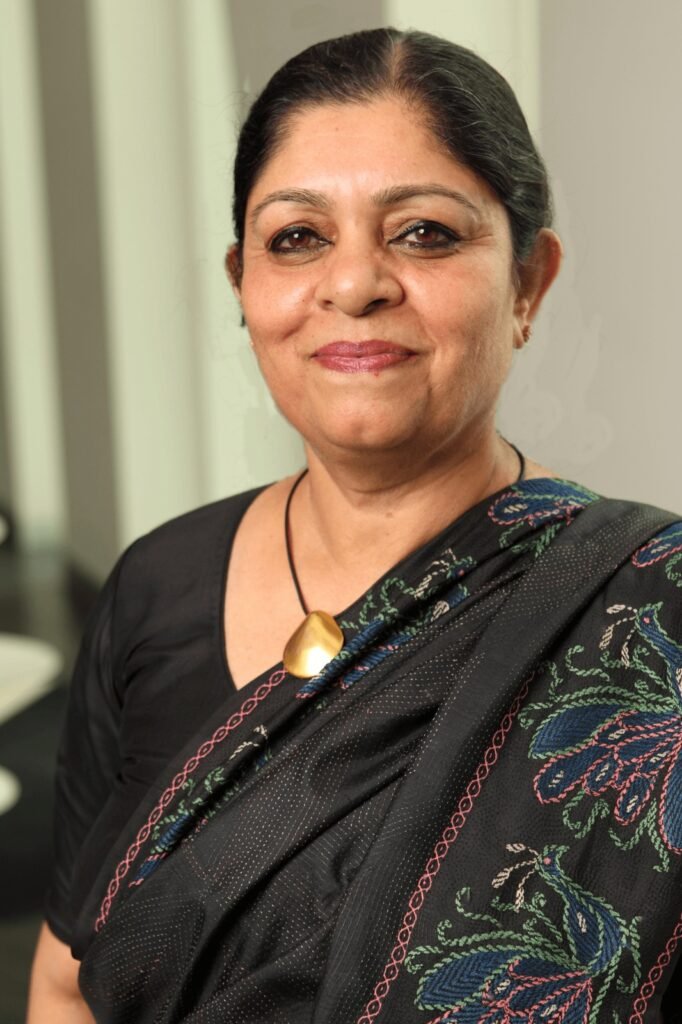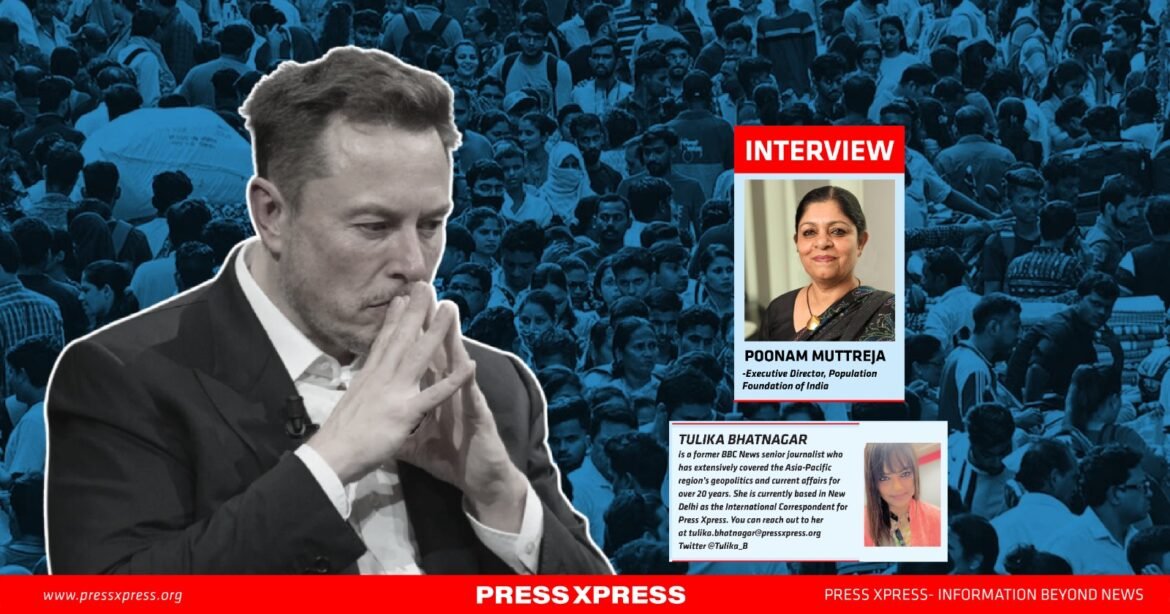Elon Musk’s concerns about population decline mirror a recurring narrative of demographic panic, according to the Population Foundation of India (PFI), Delhi-based national policy and advocacy organization.
PFI, referring to a recent post by Musk on social media platform X, said that such “fearmongering around either a population explosion or a complete population collapse” is something they hear from time to time. “But India’s reality is more nuanced,” said Poonam Muttreja, executive director, PFI, in an exclusive interview to PressXpress.
With a single “Yes”, Elon Musk, the world’s richest man, generated worldwide interest in India’s and the world’s population decline trend.
In a post on X, Musk highlighted a graph, titled “Large Population Decline Expected in China and India”, captioned as “Population collapse is our greatest threat to humanity… Elon Musk”.
The data in the post, shared originally by Tesla Owners Silicon Valley, is sourced from The Lancet journal. It shows a rapidly declining trend in some of the world’s most populous nations by 2100, triggering a global debate about looming demographic shifts.
But is it really that troubling a concern for India, which is overburdening its resources in order to meet the demands of an ever-growing population?

PressXpress’ Tulika Bhatnagar interviewed PFI’s Executive Director Poonam Muttreja who spoke about Musk’s “simplistic concerns about population collapse”, India’s challenge and potential for current population trends, migration as a tool to resolve population pressure, regressive mindsets of leaders calling for women to have more children, and the link to upcoming Census and delimitation exercise in India.
Excerpts from the interview:
Is population decline really that troubling a concern for India, which is overburdening its resources in order to meet the demands of an ever-growing population?
Elon Musk’s concerns about population decline mirror a recurring narrative of demographic panic. From time to time, we hear fearmongering around either a population explosion or a complete population collapse. However, India’s reality is more nuanced. While it’s true that according to an estimate by The Lancet, India’s population is projected to decline by around 300 million by 2100, from around 1.4 billion to roughly 1.1 billion, this is not inherently a crisis—it’s a transition.
Today, India stands at Stage 3 of what demographers refer to as the Demographic Transition Theory, where fertility rates are dropping below replacement levels (2.1 children per woman). The focus now should be on managing this transition effectively rather than fearing it.
India’s challenge isn’t a lack of people or too many people, but the uneven distribution of resources and opportunities. Overcrowding in urban areas, unequal access to healthcare and education, and environmental degradation stem from poor governance and systemic inefficiencies rather than sheer population size.
What’s often overlooked is the potential for demographic and gender dividends. India’s large working-age population can drive economic growth if investments are made in education, healthcare, skill development, and gender equality. According to Report of the Technical Group on Population Projections for India and States 2011-2036, India’s working-age population is expected to increase over the years and would reach 988.5 million in 2036.
Rather than worrying about fewer people in the distant future, India must focus on harnessing its current demographic potential, improving human capital, and planning responsibly for an ageing population.
Does PFI agree with this trend? What do your numbers project?
At the Population Foundation of India (PFI), we recognize that declining fertility rates and population stabilization are natural outcomes of socioeconomic progress. According to the NFHS-5 survey (2019-21), India’s Total Fertility Rate (TFR) has dropped to 2.0, below the replacement level of 2.1.
While population growth will continue in the short term due to population momentum (a large base of young people entering reproductive age), projections suggest that India’s population will peak by 2048 at 1.6 billion and then start to decline. A different estimate by the United Nations projects our population will peak in the 2060s at about 1.7 million.
This is not a crisis but an opportunity. A smaller population often correlates with better resource allocation, stronger education systems, and higher per capita income levels.
However, the challenge lies in regional disparities. Southern states, which have already achieved low fertility rates, face ageing populations, while northern states like Bihar and Uttar Pradesh continue to see higher fertility rates. Policies must address these disparities with region-specific approaches.
PFI firmly believes that panic-driven narratives about population decline miss the bigger picture and distorting reality leading to inaction. Declining fertility is a sign of progress, not regression.
In addition to birth control, can migration be a helpful tool to resolve population pressures?
Absolutely. Migration—both internal and external—can play a significant role in balancing population pressures. Globally, countries like United States, Canada and Germany have used pro-immigration policies to address workforce shortages caused by declining fertility rates and ageing populations, which has worked out well for them.
Millions migrate within India from states with surplus labor (e.g., Bihar, Uttar Pradesh) to regions with labor shortages (e.g., Kerala, Tamil Nadu). These migration patterns must be better understood, planned, and supported with migrant-friendly policies.
India also has the potential to export skilled workers to countries facing demographic decline. This can generate significant economic remittances and strengthen India’s global economic ties.
At the same time, internal migration policies must address issues of housing, healthcare, sanitation, and job security for migrants to prevent exploitation and social unrest. Data-driven strategies, drawn from Census and NFHS surveys, are essential for creating policies that benefit both migrants and host states.
Migration, if managed proactively, can be a win-win solution—easing population pressures in overburdened regions and addressing labor shortages in others.
Recently, south Indian chief ministers Chandrababu Naidu and MK Stalin gave public statements that “women should have more children… in the name of national duty”. Will Musk’s post encourage such an attitude in India where leaders are coming out with statements like these?
This narrative is deeply concerning and reflects a regressive mindset that undermines decades of progress in women’s autonomy and reproductive rights.
Women must never be viewed as instruments for achieving demographic goals. Calls for women to have more children as a matter of national duty ignore the complex social and economic realities that influence fertility rates, such as education, healthcare access, and workforce participation.
Globally, countries like Sweden and Denmark have shown that progressive policies—affordable childcare, equal parental leave, and workplace protections for women—are far more effective in supporting family growth than pressuring women into childbirth.
Musk’s simplistic concerns about population collapse risk amplifying these harmful narratives. Policymakers in India must remember that women have the right to choose if, when, and how many children to have.
Population growth cannot be addressed by coercion or social pressure, but through empowerment and education.
Leaders must focus on policies that support families holistically—not statements that reduce women to their reproductive roles.
India is set to conduct its much-delayed Census in 2025, followed by a comprehensive delimitation exercise in 2026. What are your observations on how India’s estimated 1.42 billion population by 2026 will impact the delimitation exercise?
The Census and Delimitation are critical milestones for India. The population data gathered will serve as the basis for redistributing parliamentary seats across states.
However, the demographic landscape has changed dramatically since the last time the number of Lok Sabha seats were frozen in 1976. Southern states, having achieved low fertility rates and stable populations, now face a situation where their parliamentary representation may shrink if seats are redistributed purely based on population.
Delimitation must be approached with sensitivity, transparency, and fairness, ensuring that states aren’t discouraged from pursuing population stabilization policies.


